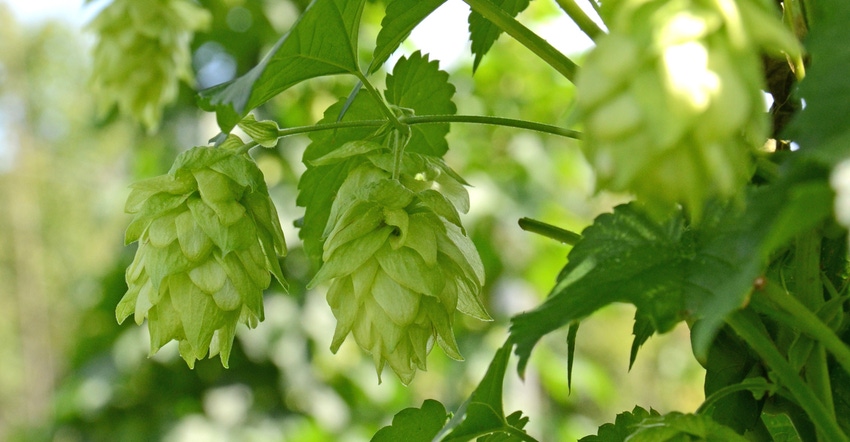May 20, 2021

The Hop Production in Midwest and Eastern North America online course is now open for registration, provided by the Great Lakes Hop Working Group.
The course provides comprehensive presentations and resources that address all aspects of hop production from economic considerations to postharvest handling. The course was developed for beginner or prospective hop producers, but could also be used by more experienced hop growers.
Content for the on-demand course includes industry review, hopyard construction, cost of production, stages of production, horticultural practices, disease management, insect management, weed management, beneficial insects, pesticide considerations, harvest, postharvest and marketing.
The cost to register is $50 and includes all course content. Pesticide recertification credits are available for Michigan applicators. A certificate is available upon completion of all coursework. Register at canr.msu.edu.
Bill would give veto power for eminent domain
Ohio House Bill 63 would allow a municipality or township to veto the use of eminent domain for a recreational trail in its jurisdiction if requested by an affected property owner.
More than a dozen landowners affected by a bike path in Mahoning County testified in two hearings before the civil justice committee supporting the bill, which was proposed by Reps. Al Cutrona, R-Canfield, and Reggie Stoltzfus, R-Paris Township. No further hearings on the proposal are scheduled.
OFB welcomes new communications specialist
To help Ohio Farm Bureau and county Farm Bureaus with design projects, as well as photography and video production, Dave Gore of Marysville has been named OFB communications specialist. Since 2013, he had served as the organization’s print services coordinator.
Previously, Gore, who is a member of the Franklin County Farm Bureau, spent 10 years as the fulfillment coordinator for the Ohio State Bar Association.
Bipartisan bill seeks to aid beginning farmers
A bipartisan bill to help beginning farmers by establishing a tax credit for businesses that sell or rent land, animals, facilities or equipment to a beginning farmer has passed out of committee and awaits a vote in the Ohio House.
House Bill 95, sponsored by Susan Manchester, R-Waynesfield, and Mary Lightbody, D-Plain Township, would apply to individuals with a net worth of less than $800,000 who are seeking entry into farming or have been farming less than 10 years and meet the Ohio requirements of a beginning farmer.
Income tax credits for businesses that sell or rent assets to beginning farmers would be 5% of the sale price of an agricultural asset, 10% of the annual gross rental income on a cash lease, or 15% of the gross rental income on a share lease.
Beginning farmers who attend an approved financial management program can receive a tax credit for the cost of the program.
Insurance options for vegetable growers
Risk management programs can take the edge off major losses from lower yields, crop losses or prevented planting from weather events.
The latest publication from the Beginning Farmers DEMaND series explores risk management programs for vegetable producers. Offered through the USDA’s Risk Management Agency and Farm Service Agency, these programs seek to mitigate some of the production risk that producers face on an annual basis.
Download the latest bulletin in the Beginning Farmers DEMaND (Developing and Educating Managers and New Decision-makers) series at canr.msu.edu.
Conservation project gets $7.8 million for Western Lake Erie Basin
The USDA Natural Resources Conservation Service has funded a multistate conservation program — to the tune of $7,780,799 — to protect natural resources, enhance soil health, improve water quality, and support landowners in the Western Lake Erin Basin region.
Titled the Lake Erie Conservation Partnership, the grant is for a five-year program and was awarded to the Indiana State Department of Agriculture, Michigan Department of Agriculture and Rural Development and Ohio State University, which will work together collectively to focus on nutrient management, erosion control, water management and more.
This funding will aim to steward new conservation programs in all three states and will be used for demonstration sites of soil conservation practices.
The conservation focus area for these efforts is in the Western Lake Erie Basin, which covers nearly 7 million acres, and it encompasses most of northwest Ohio, as well as portions of northeast Indiana and southeast Michigan.
These funds from USDA-NRCS are part of a Regional Conservation Partnership program. USDA is investing a total of $23.2 million in three Regional Conservation Partnership programs in the Western Lake Erie Basin.
Burch elected to Ohio Farm Bureau board of trustees
Danielle Burch of Salem has been elected to the Ohio Farm Bureau Federation board of trustees, representing members in District 9 — which is composed of Columbiana, Mahoning, Portage and Stark counties.
She was elected during a special election by delegates from that four-county area and fills the unexpired term of Frank Burkett of Massillon. Burkett stepped down as Ohio Farm Bureau president and trustee in April and was elected to the board of directors for Nationwide.
Before her election to the Ohio Farm Bureau board of trustees, Burch served as president of Columbiana County Farm Bureau.
Burch and her husband, Andrew, have three children and operate a 250-acre freezer beef and pork operation in Salem, where she is a member of the Winona Fire Department Auxiliary and Hanoverton Church of Christ.
You May Also Like




